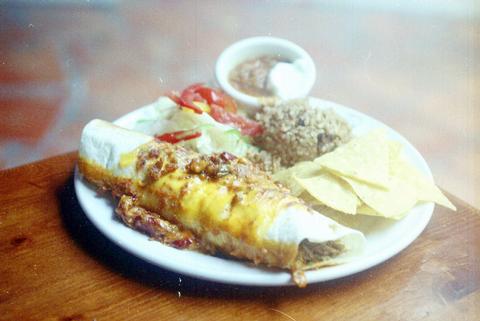For Taipei's foreign population, Grandma Nitti's Kitchen is one of the few places to find food that reminds them of home.
Contrary to popular musings, there was neither a grandma nor someone named Nitti in its kitchen, only Rainbow Lin (林虹慧), the founder and owner of the restaurant. With strong interest in cooking and encouragement from her American friends, Lin started a humble five-table eatery, where she doubled as its chef, near National Taiwan University 14 years ago to cater to the needs of homesick foreigners in Taipei. That was before the deluge of customers forced Grandma to expand to a three-story building in an alley off Shita Rd.

PHOTO: DAVID VAN DER VEEN, TAIPEI TIMES
Although targeting Western appetites, Lin never promises to provide the "authentic" flavor. "The name of the restaurant tries to tell people that we offer dishes that taste like their mother's cooking in a home environment. We wouldn't brag that what we offer is 100 percent authentic, because every mother cooks in her own way," Lin said.
Starting with only 10 simple items like omelets and sandwiches, Grandma's heavy-volume menu is the result of years of trials on Lin's many foreign friends to make sure that the items satisfy Western tastes.
Grandma prides itself on breakfast items, which helped it establish its popularity in its early years.
The vegetarian Greek veggie and feta cheese omelet (NT$250) is a must-try even for non-vegetarians. The omelet's rich filling of vegetables and cheese flows out at the slit of the knife.
Later this month, several new items will be added to the menu, including the veal with red wine sauce and sauteed mushroom (NT$350) and chicken tequila fettuccine (NT$350). The latter combines pasta with lightly cooked chicken and sweet peppers, creating a delightful color scheme. The otherwise bland dish is prepared with tequila to give it an unique aroma.
The menu also includes a mix-and-match section of lunch items so that for between NT$150 and NT$200, diners can pick a combination from the list of fillings like chili beef patty and Tex-Mex veggie and breads like pita and focaccia.
Refillable coffee and tea (NT$100) is an important attraction for many of Grandma Nitti's customers. On weekends, groups of friends can be seen whiling away the afternoon drinking coffee and chatting in its laid-back environment.
For food of the mind, Grandma hosts a second-hand English-language store that is open every Sunday afternoon.
Being a popular meeting point between foreigners in Taipei, Grandma has a useful whiteboard at its front door for people to post housing or language-learning information.

This is the year that the demographic crisis will begin to impact people’s lives. This will create pressures on treatment and hiring of foreigners. Regardless of whatever technological breakthroughs happen, the real value will come from digesting and productively applying existing technologies in new and creative ways. INTRODUCING BASIC SERVICES BREAKDOWNS At some point soon, we will begin to witness a breakdown in basic services. Initially, it will be limited and sporadic, but the frequency and newsworthiness of the incidents will only continue to accelerate dramatically in the coming years. Here in central Taiwan, many basic services are severely understaffed, and

Jan. 5 to Jan. 11 Of the more than 3,000km of sugar railway that once criss-crossed central and southern Taiwan, just 16.1km remain in operation today. By the time Dafydd Fell began photographing the network in earnest in 1994, it was already well past its heyday. The system had been significantly cut back, leaving behind abandoned stations, rusting rolling stock and crumbling facilities. This reduction continued during the five years of his documentation, adding urgency to his task. As passenger services had already ceased by then, Fell had to wait for the sugarcane harvest season each year, which typically ran from

It is a soulful folk song, filled with feeling and history: A love-stricken young man tells God about his hopes and dreams of happiness. Generations of Uighurs, the Turkic ethnic minority in China’s Xinjiang region, have played it at parties and weddings. But today, if they download it, play it or share it online, they risk ending up in prison. Besh pede, a popular Uighur folk ballad, is among dozens of Uighur-language songs that have been deemed “problematic” by Xinjiang authorities, according to a recording of a meeting held by police and other local officials in the historic city of Kashgar in

It’s a good thing that 2025 is over. Yes, I fully expect we will look back on the year with nostalgia, once we have experienced this year and 2027. Traditionally at New Years much discourse is devoted to discussing what happened the previous year. Let’s have a look at what didn’t happen. Many bad things did not happen. The People’s Republic of China (PRC) did not attack Taiwan. We didn’t have a massive, destructive earthquake or drought. We didn’t have a major human pandemic. No widespread unemployment or other destructive social events. Nothing serious was done about Taiwan’s swelling birth rate catastrophe.